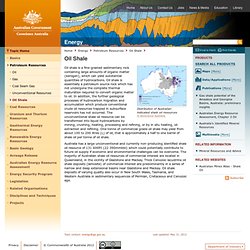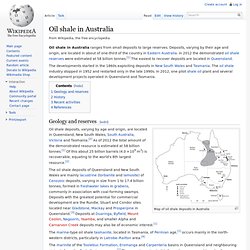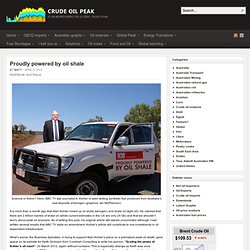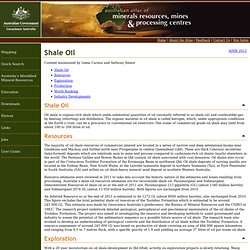

Oil Shale. Oil shale is a fine-grained sedimentary rock containing large amounts of organic matter (kerogen), which can yield substantial quantities of hydrocarbons.

Oil shale is essentially a petroleum source rock which has not undergone the complete thermal maturation required to convert organic matter to oil. In addition, the further geological processes of hydrocarbon migration and accumulation which produce conventional crude oil resources trapped in subsurface reservoirs has not occurred. The unconventional shale oil resource can be transformed into liquid hydrocarbons by mining, crushing, heating, processing and refining, or by in situ heating, oil extraction and refining. Oil shale in Australia. Oil shale in Australia ranges from small deposits to large reserves.

Deposits, varying by their age and origin, are located in about of one-third of the country in Eastern Australia. in 2012 the demonstrated oil shale reserves were estimated at 58 billion tonnes.[1] The easiest to recover deposits are located in Queensland. The developments started in the 1860s exploiting deposits in New South Wales and Tasmania.
The oil shale industry stopped in 1952 and restarted only in the late 1990s. In 2012, one pilot shale oil plant and several development projects operated in Queensland and Tasmania. Geology and reserves[edit] Map of oil shale deposits in Australia The oil shale deposits of Queensland and New South Wales are mainly lacustrine (torbanite and lamosite) of Cenozoic deposits, varying in size from 1 to 17.4 billion tonnes, formed in freshwater lakes in grabens, commonly in association with coal-forming swamps. History[edit] Recent activities[edit] References[edit] Geoscience Australia Free Data Download. Proudly powered by oil shale. Science or fiction?

Here, ABC TV star journalist A. Kohler is seen testing synthetic fuel produced from Australia’s vast deposits of kerogen (graphics: Ian McPherson) It is more than a month ago that Alan Kohler mixed up oil shale (kerogen) and shale oil (tight oil). He claimed that there are 2 trillion barrels of shale oil (while current estimates in the US are only 24 Gb) and that we shouldn’t worry about peak oil anymore. As of writing this post, his original article still stands uncorrected although I had written several emails that ABC TV adds an amendment. What’s worse, the Business Spectator, in trying to support Alan Kohler’s piece on a premature peak oil death, gave space on its website for Keith Orchison from Coolibah Consulting to write his opinion, “Scaling the peaks of Kohler’s oil clash“, 20 March 2012, again without numbers.
This article is an analysis of Keith’s piece. Contents: (1) History of recent debating club proceedings (2) Filling the gap (7) Some well count numbers. Shale Oil - AIMR 2011 - Australian Mines Atlas. Shale Oil Oil shale is organic-rich shale which yields substantial quantities of oil (normally referred to as shale oil) and combustible gas by heating (retorting) and distillation.

The organic material in oil shale is called kerogen, which, under appropriate conditions in the Earth’s crust, can be a precursor to conventional oil reservoirs. Convert PJ to tonne of oil equivalent. <p><span><strong>Please enable Javascript to use the unit converter</strong></span></p> How many PJ in 1 tonne of oil equivalent?

The answer is 4.1868E-5. We assume you are converting between petajoule and tonne of oil equivalent. You can view more details on each measurement unit:PJ or tonne of oil equivalent The SI derived unit for energy is the joule. 1 joule is equal to 1.0E-15 PJ, or 2.38845896627E-11 tonne of oil equivalent. Note that rounding errors may occur, so always check the results. The SI prefix "peta" represents a factor of 1015, or in exponential notation, 1E15.
So 1 petajoule = 1015 joules. The definition of a joule is as follows: The joule (symbol J, also called newton meter, watt second, or coulomb volt) is the SI unit of energy and work. ConvertUnits.com provides an online conversion calculator for all types of measurement units. This page was loaded in 0.0030 seconds.